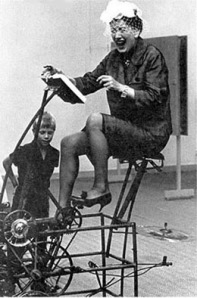The objective formulated by Louca – for the struggle for work and capitalist organisation of work to mark the present and the future – implies the perpetuation of the current mode of production. By Ricardo Noronha
“Holloway against the right to work”. It was under this heading that Francisco Louca published an article in the online journal Vírus, critiquing in a polemical tone an intervention by John Holloway at the International Colloquy “May ’68: Politics, Theory and History” which took place at the Franco-Portuguese Institute in April 2008.
The notes which follow look to contextualise Louca’s article in the wider politics of the party he leads – the Bloco de Esquerda [‘Left Bloc’, a reformist party in Portugal established by Trotskyist and Maoist groups] – and a political conception common to the ‘anti-capitalist’ or ‘anti-neoliberal’ parliamentary left in Europe. We will avoid using the terms in which Holloway puts forward his views and those Louca uses to critique them. For the purposes of what interests us, we will limit ourselves to explaining their analyses.
“The bourgeoisie have very good grounds for falsely ascribing supernatural creative power to labour; since precisely from the fact that labour depends on nature it follows that people who possess no other property than their labour power must, in all conditions of society and culture, be the slaves of others who have made themselves the owners of the material conditions of labour. They can only work with their permission, hence live only with their permission… This is the law of all history hitherto. What, therefore, had to be done here, instead of setting down general phrases about “labour” and “society”, was to prove concretely how in present capitalist society the material, etc., conditions have at last been created which enable and compel the workers to lift this social curse.” (Karl Marx, Critique of the Gotha Programme, 1875)
 1.According to Francisco Louca there are three reasons put forward by Holloway as political justification for his refusal of the struggle for the ‘right to work’: 1) we must stop continually reproducing capitalism via commodity production; 2) it is possible to create pockets of resistance and dissidence where use-value predominates over exchange value; 3) taking power is not a condition for the transformation of the world, since it is possible to counterpose an ‘anti-power’ to it. From his standpoint, this politics also means self-imposed exile. For Holloway, on the contrary, according to his statements in the aforementioned meeting, the demand for “jobs” alongside “healthcare” and “education” does nothing but reproduce and banalise the representation of salaried work as a good thing essential to human survival and inevitable objective of societal organisation.
1.According to Francisco Louca there are three reasons put forward by Holloway as political justification for his refusal of the struggle for the ‘right to work’: 1) we must stop continually reproducing capitalism via commodity production; 2) it is possible to create pockets of resistance and dissidence where use-value predominates over exchange value; 3) taking power is not a condition for the transformation of the world, since it is possible to counterpose an ‘anti-power’ to it. From his standpoint, this politics also means self-imposed exile. For Holloway, on the contrary, according to his statements in the aforementioned meeting, the demand for “jobs” alongside “healthcare” and “education” does nothing but reproduce and banalise the representation of salaried work as a good thing essential to human survival and inevitable objective of societal organisation.
2. “It would necessarily be a “pocket” where there was no money, because any monetary exchange presupposes exchange values. This “space” could not exist in any capitalist society; perhaps it could be created on a commune isolated from the rest of the world, only having consumption which corresponded to local production. It is a utopia, but a reactionary one. Only a tyrannical regime could imagine such an idyll where consumption is determined not by individual choice, but where it is managed, and where there is no access to global forms of action and communication.” Thus Louca describes what he considers to be the logical development of John Holloway’s ideas. Moving on from this he critiques Negri’s proposal for a universal income – which separates living standards from productive activity – on the grounds that it would render the beneficiary “dependent on the state”.
Francisco Louca counterposes to this self-imposed exile, or universal income, the struggle for full employment “If you want my opinion, it is certain that given their experience the unemployed will continue to fight for the right to work and for the margin of autonomy that a salary allows: this action and social organisation marks both the present and the future.”

3. The understanding that unemployment is a weapon in the hands of capital to push down salaries and increase exploitation has accompanied the workers’ movement since its formation. The “right to work” was one of the main demands of the working-class struggles in France following the February Revolution of 1848, as Marx described in his Class struggle in France and The Eighteenth Brumaire of Louis Bonaparte. Above all, this mean the right to income independent of capitalist cycles and its oscillations between peaks of frenetic activity and periods of stagnation in production.
We must understand, nonetheless, that things change, and much has done so since those long-gone days. Besides, it is also Marx who reminds us that the demand for the “right to work” was hardly frightening for the bourgeoisie given its ability to transform the idea into its opposite, via the creation of “National Offices” where the state guaranteed work and salaries to unemployed workers: work on landfill sites, which was boring, monotonous and unproductive, under an outdoor prison regime. Given a system in which “all that is solid melts into air” it would be strange for the historic forms of working class struggle to maintain their freshness across all this time.
4. Besides the romantic image of a commune outside of capitalism – ahistorical and with an autarchic tendency – the history of class struggle has not ceased to present examples of concrete struggles against wage labour, at the heart of capitalist production itself. All industrialisation processes have been marked by the struggle against subjection to industrial labour, against the private appropriation of collective resources, against the commodification and monetarisation of social life, and against the processes which disciplined the working masses. In the early days of capitalism each labour conflict contained in itself elements of a civil war, whose pacification was gradually transformed into a scientific method, combining sophisticated measures with brutal ones. These struggles have continued throughout the history of capitalism, forced to constantly adapt, expand and develop. Each one of them has resulted in an evolution of the mode of production in the measure which – as well as repressive measures taken against the most radical, politicised and intransigent elements – capitalism has recuperated and incorporated, responding to workers’ needs by integrating them into the dynamic of its own development. The historic tendency for the organic composition of capital to increase, rising productivity and the political regulation of the relations of production mark the evolution of successive stages of capitalist development and the process of the subordination of human activity to the accumulation of capital. It was the pressure of class struggle which forced capitalist production to extend its dominion across the world and subordinate all society to the law of value, as well as deepening the mechanisms of exploitation characteristic of relative surplus value.
5. We should therefore deal with the questions in the terms in which the class struggle places them, and not run away from them. The centrality of full employment to the strategic horizons of the Bloco de Esquerda is nothing new, nor original to that party. In the same way, claiming the Enlightenment tradition as our own, glorifying modernity and narrating history as continual progress, has always accompanied the institutionalisation of workers’ movement organisation at the bosom of the capitalist state. The objective formulated by Louca – for the struggle for work and capitalist organisation of work to mark the present and the future – implies the perpetuation of the current mode of production. Equally, the invocation of the margin of autonomy conferred by one’s salary, a benefit like individual choice, autonomy of consumption and access to global forms of communication and action, form a political discourse which naturalises the mechanisms of exploitation and domination at the same time as failing to describe the violence, suffering, frustration and misery that makes them function.
6. The fetishism of the legal form in which this discourse places itself indicts its fundamental identification with the capitalist state as the privileged site of politics. We demand our rights, protest against their not being enforced, challenge attempts to weaken them and control their application. The condition for the possibility of each strategy is based on its compatibility with the capitalist order, representative democracy, the law and the institutionalisation of conflicts. Within this limited historical framework, the formula “full employment” presupposes a contract between capital and labour across the whole of society, regulating salary relations as a transaction between two parties. Put in these terms – those of commodities and their respective value – an analysis of the costs and benefits for the bourgeoisie cannot help but render the evolution of the sum total of salaries dependent on a complete pacification and integration of the workforce into its own schema for management and production. The costs of full employment could only be supported by a radical diminution of labour conflicts.

- sculpture by Jean Tinguely
7. As regards the other party to the contract, there also appear to be few reasons for enthusiasm. The contradiction in capitalist production Louca claims to be non-existent – between exchange value and use value – manifest themselves in the figure of the salaried worker, who always receives in her salary an exchange value inferior to the use value which her labour power represents for the boss. From the standpoint of she who works, therefore, the salary is just a fraction of the total value she produces. It becomes difficult, given a critical and questioning stance, to celebrate a margin of autonomy which is, fundamentally, based on a mechanism of exploitation. It is still more difficult to imagine that the only alternative to this margin of autonomy consists of no autonomy.
8. Delving into the materiality of monotonous, repetitive, boring or stupefying jobs – never mind those which are exhausting, dangerous or harmful – which constitute the crushing majority of jobs, the matter becomes even more problematic. The proliferation of technological mechanisms of control and monitoring of work, the spread of factory discipline into the service sector, the casualisation of work relations, the generalisation of fear and silencing, the acceleration of work rhythms and the infinite extension of work hours are so many other conditions for an accentuated devaluing of the labour-power commodity. The conditions which currently make capital investment attractive are the same as those which make work – and, increasingly, everyday life itself – ever less bearable.
9. The other side of this situation – the biopolitical game implicit to “company cultures” and the more ambitious ideas of informality and horizontalism in the sectors at the forefront of the new economy – have also not properly traced the paths of autonomy, divided between the impotent cynicism of the most aware and the unconditional domestication of the most timid. The labour market today presents itself, in its best defence, as something supportable if only because it is the only possible form of subsistence and satisfaction of material needs in the context of generalised commodity production. But no-one is so stupid as to be completely unaware that the life you sell is infinitely more precious than the subsistence you buy.
10. If the forms of solidarity and collective identity which once characterised the behaviour of the working class now appear to be everywhere in retreat even to the point of disappearance, nonetheless it is not completely useless to identify in the organisation of work itself the secret behind this disappearance. More than making work economically productive, the modern forms of organisation concern themselves with wiping out workers as a political subject. It is in understanding this problematic that we find space for a renovated critique of political economy.

11. Is it still possible to think we might be able to break this vicious circle of domination? If running away from it is presented as a way out of a system with no exit route – because it exists everywhere and constitutes an enormous force in society – still the opposite appears strategically more interesting: the lines of a possible break can be found in the spontaneous reaction of the workforce against the control to which it is subjected. Behind the apparent passivity there can be much more than just resignation. Equally the definition of a thing – whether it be a plant, an object, an area, a journey, a film, a beach, a glass of water, eight hours of a life – as a commodity, remains subordinated to a symbolic game and a determined relation of forces which the radical critique is intended to transform. More than a salary, a fixed job post or a union card, what characterises the proletariat is its fundamental contradiction: a subordinate role in the heart of capitalist society coexists with its potential for insubordination, which capital uses all means at hand to complain about, trap, recuperate and domesticate. With or without a job, with higher or lower salary, with more or less (or no) rights, the fundamental from the standpoint of the capitalist order is that the proletariat accepts that the best possible outcome is to resign itself to the behaviour prescribed as “normal” – whether that is rampant consumerism or imposed austerity, black-market labour or collective contracts, unemployment benefits or emigration. Conversely, if in the capitalist system it behaves like an outsider, facing up to its specific and partial standpoint, refusing to let itself be defined by that system, it is forced to face up to the vicious circle in order to break it.
12. The struggle against work appears furthermore as a conscious and collective strategic development of a generalised individual attitude, including a moral condemnation of the system and a search for space within it. It is the strategy of domination itself which highlights the weak points and breaches in the current set-up. The alarms, CCTV, proliferation of private security guards, generalised misinformation, computer monitoring systems, fortified borders, privatisation of public space and biometric controls are so many signs that the bourgeoisie is not sleeping easily. The processes of fragmentation and division in its organisation of work would be useless faced with a force of class recomposition focussing on the proliferation of means of communication and space for socialisation. The imprisoning function of its architecture is useless for stopping the generalised use of its walls for anonymous art and its streets for unauthorised parties. The commodities sold in its stores would lose all value if appropriated directly by those who need them or simply want them. Under the tranquilising cover of its triumphalist discourse, the bourgeoisie is afraid. The economists, city planners, sociologists and computer technicians it employs keep it well informed about the risks it runs. Its most lucid historians continually remind it of that wretched month of May, 40 years ago, when it could not find in the whole city of Paris a single worker willing to obey it.
13. The strategic and theoretical debate about superseding the capitalist mode of production presents obvious difficulties. It appears as if caught between two time-frames, the short term of everyday political action and the long term of historic transformations. Escaping this bind generally implies choosing one or the other and a division of labour – between theorists who theorise and activists who take action – which reproduces the fundamental characteristics of exactly that society which we seek to overcome. Uniting the two time-frames and elaborating strategies for struggle with a wider historical horizon than just the immediate appears as a demanding task. Still, the only possibility amid the disillusionment inherent to those who follow one of the two paths – or take them both but in succession – is that they will not secure any of the hoped-for results. The mass of dissidents which incessantly mounts up on the sidelines of subversive parties, tendencies and traditions can change the rules of this game simply by deciding to play. Why fight to have a job when we could fight for everything?
Original at http://passapalavra.info/?p=13840
Translated by The Commune





